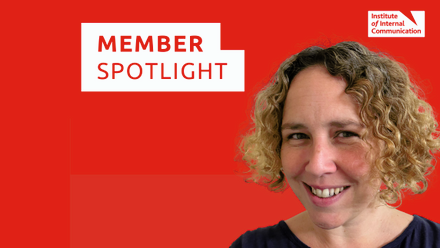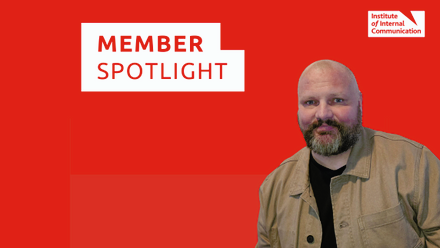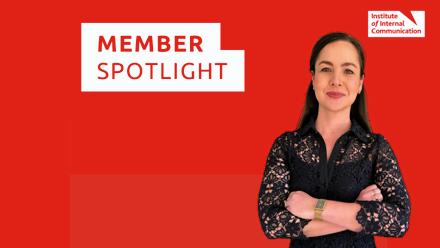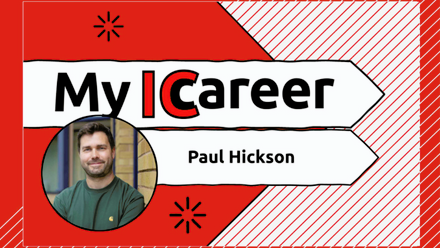‘I learned the hard way that less is more’

Nearly four years ago, I was sitting at home and, like many people at the time, I was expecting to be back in the office in a couple of weeks. Little did I know I wasn’t returning to the office and I wasn’t returning to my job.
In 2020, I was working in an events role for Provincial, providing tours and virtual reality demonstrations in Dublin when the Covid-19 pandemic hit. Completely at a loss, I knew I wanted to return to the communications industry and I wanted to work with people; I loved the idea of internal comms, but never found the right entry role to the industry.
After some research, I discovered the company I worked for had no IC manager. I put on my creative hat and created a presentation outlining the benefits of a dedicated IC function and sent it off to the CEO. Within a few months, I was working on projects for the management team. By the end of the year, I was hired as the company’s first internal communications manager.
Here are some reflections from my career so far.
- Listen
It sounds basic, right? I started the role during the pandemic, which meant I couldn’t get on-site to meet our employees or even meet my team.
To make things more difficult, most of our employees aren’t desk-based, so trying to set up a video call was nearly impossible; after a 12-hour shift, there was no chance of a call to chat through communications.
It wasn’t until I had the opportunity to get on-site that I realised the importance of listening to our team. I organised focus groups and surveys, soaked up all the feedback and used this to create a strategy.
However, the most valuable feedback I received was from having those in-person conversations, asking about their day, finding out about their roster, learning about the highs and lows of working in the security industry. You sometimes just don’t get those same results over a Zoom call.
- Keep it simple
Of course, in my first IC position, I wanted to make a good impression, so I started working on a newsletter and email templates and anything that came my way. If there was a request to send an email, I would say yes and off it went.
With a low click-through rate, I was scratching my head pondering why nobody was reading my emails. Looking back now, I wince at the amount of content I was sending and the length of some of those articles.
I learned the hard way that less is more. While hours of work went into feature-length articles and detailed designs, all the team really wanted was relevant, shortform information. For every campaign and piece of communication, I now ask myself: what is the call to action? Is this a need to know or a nice to know?
- Ask for help
In the first year in my role, I was struggling to keep my head afloat. I never openly admitted it, but I felt out of my comfort zone and questioned, many times, my decision to send that presentation for an IC role.
I started making connections on LinkedIn and following thought leaders in the industry. I reached out to Joanna Parsons desperately seeking advice and we arranged a Zoom call. Full of nerves, we talked through my worries and she helped narrow my focus. To this day, I am still incredibly grateful for her time.
Some months later and after posting in the IoIC Ireland LinkedIn group, I was able to find a mentor and gain advice from leading IC professionals (a quick shout out to my first mentor Sinead Bell who still answers my texts!).
For anyone new to the industry, mentoring is an amazing way to gain advice and ask those questions that sometimes feel very basic. There is never a stupid question. I have yet to reach out to an internal communications professional who hasn’t responded. It’s an incredibly supportive community.
- Don’t be hard on yourself
I absolutely love internal communications and I am very fortunate to work for a company that supports and understands the value of IC.
However, there are times when I feel frustrated: asking myself why the click-through rate has dropped or how I can measure impact more effectively, looking at my to-do list and hoping one day I can sink my teeth into that wishlist project.
It wasn’t until I started speaking with other professionals that I learnt our frustrations are common. There are a lot of IC teams that are small or, like me, a team of one. I have learnt to be creative in an industry that is shaped by policies and procedures. Coming into the role, my knowledge of strategies, KPIs and audits was limited. Taking the time to learn and grow my expertise is important and I still take the time to educate myself and keep up with industry developments. Two of my favourite books that I often refer to are ‘Neuroscience for Organizational Change’ by Hilary Scarlett and ‘Better Internal Communications’ by Lesley Allman.
I could go on reflecting on my first few years and I am certain I will make mistakes and learn from them over my career. I can absolutely say that I am not the same person who started their career in IC four years ago; I was thrown into the deep end and since then have solved problems I never would have envisioned, built relationships with leaders, gained hands-on experience and developed my strategic thinking.
Who knows what the next four years have in store but I am excited to find out!






